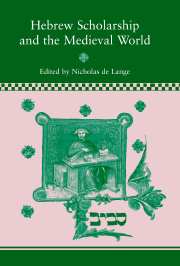Book contents
- Frontmatter
- Contents
- The contributors
- Preface
- List of abbreviations
- PART ONE NEW LINES OF INVESTIGATION
- 1 The study of medieval Karaism, 1989–1999
- 2 Hebrew scholarship in Byzantium
- 3 Hebrew philology in Sefarad: the state of the question
- 4 Some recent developments in the study of medieval Hebrew liturgy
- PART TWO THE HEBREW LANGUAGE
- PART THREE PRAYER AND POETRY
- PART FOUR THE WORLD OUTSIDE
- Bibliography of the writings of Raphael Loewe
- Index of names
2 - Hebrew scholarship in Byzantium
Published online by Cambridge University Press: 21 January 2010
- Frontmatter
- Contents
- The contributors
- Preface
- List of abbreviations
- PART ONE NEW LINES OF INVESTIGATION
- 1 The study of medieval Karaism, 1989–1999
- 2 Hebrew scholarship in Byzantium
- 3 Hebrew philology in Sefarad: the state of the question
- 4 Some recent developments in the study of medieval Hebrew liturgy
- PART TWO THE HEBREW LANGUAGE
- PART THREE PRAYER AND POETRY
- PART FOUR THE WORLD OUTSIDE
- Bibliography of the writings of Raphael Loewe
- Index of names
Summary
A NEGLECTED SUBJECT
Modern study of Hebrew scholarship in Byzantium has a relatively short history. Despite the ground-breaking publications of Samuel Krauss, on the eve of the First World War, and of Joshua Starr, on the eve of the Second, scholars have been slow to take up the challenge of investigating Byzantine Hebrew culture or even, indeed, to recognize its existence. Despite these slow beginnings, a good deal of progress has been made in the last decades of the twentieth century, and it is my purpose in this chapter to draw attention both to the achievements and to some of the main gaps that remain to be filled. Having recently surveyed elsewhere the history of the use of Hebrew in Byzantium, I shall endeavour to avoid repeating myself here, and shall focus on the study of Hebrew, rather than its use for prayer or communication, hard though it is to draw a firm distinction.
The ignorance and even contempt with which Byzantine Jewish culture has too often been treated reflects attitudes to Byzantium in general which have regrettably been widely prevalent in Western scholarship. Krauss (following in the footsteps of Perles) was ahead of his time in his positive appreciation of it. The estimate of Starr (‘The contribution of Byzantine Jewry to the culture of their people appears to have been on the whole rather mediocre’, 1939: 50) represents a more usual trend, even though his judgement is contradicted by some of the primary and secondary sources that he himself quotes in his book. The well-known problem of scholarly prejudice is compounded by a serious shortage of hard evidence.
- Type
- Chapter
- Information
- Hebrew Scholarship and the Medieval World , pp. 23 - 37Publisher: Cambridge University PressPrint publication year: 2001
- 2
- Cited by



